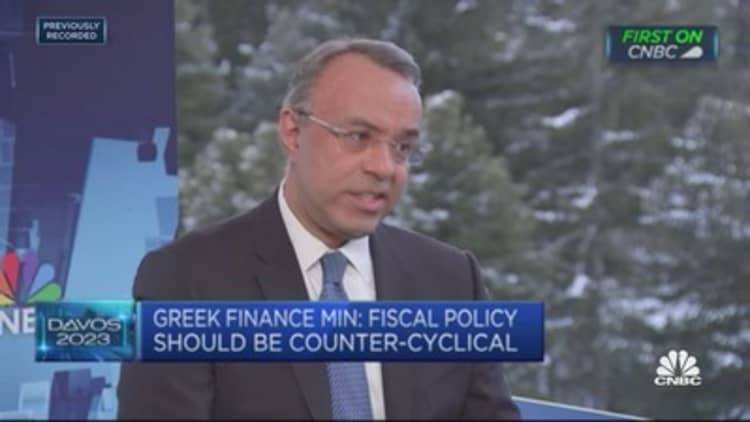Greek stocks are up 40% year on year — as the country shakes off ‘problem child of Europe’ label
[ad_1]
Tourists in front of Academy of Athens building in Athens, Greece, on Monday, May 22, 2023. Greek Prime Minister Kyriakos Mitsotakis pummeled his opposition in Sunday’s national election, moving a step closer to getting another four-year term and sending markets higher on the prospect that the premier’s investment-friendly policies will continue.
Bloomberg | Bloomberg | Getty Images
Greek stocks posted big gains on Monday after a national election that saw the ruling party achieve an unexpectedly large share of the vote.
The New Democracy party’s 40.8% win, trouncing the second-placed leftist Syriza party’s 20.1%, still left it short of a parliamentary majority. A new vote looks set for June 25, in which New Democracy is favorite to secure a victory under election rules that will see the party gain 50 additional parliamentary seats, if it achieves over 40% of votes again.
As the result became clear at the start of the week, stocks measured on the Athens General Composite Index shot up nearly 7% and rose slightly Tuesday, despite pessimism in global equity markets.
The strong daily movement was partly because the Greek market is “small and shallow,” and traders had priced in the potential for a three to four-party coalition that could create instability, said George Lagarias, chief economist at Mazars Wealth Management.
It nonetheless takes index gains to nearly 30% in 2023 to date and to over 40% over the past year, trading near the levels of roughly 10 years ago — which says more about reforms to Greece and its economy than short-term bets, Lagarias added.
“The incumbent government is considered business friendly,” he said, and investors now expect the kind of stability likely to come from a comfortable majority.
There are several key ways it has secured that image during its time in government under Prime Minister Kyriakos Mitsotakis since 2019, economists and analysts told CNBC.
The first was to take significant steps towards improving Greek’s antiquated bureaucratic systems in areas such as taxation, speeding up and modernizing systems for individuals and businesses.
Several economic successes have also attracted attention: the early repayment of Greece’s IMF loans, a high but declining debt-to-GDP ratio, a sustained rise in employment and higher deposits, consumption and corporate revenues.
Greek economic growth was 5.9% in 2022, well above the 3.5% rate in the euro zone, and is forecast at 2.2% by the Greek central bank in 2023, according to Reuters. As of this week, the country’s 10-year bond yield hit a 24-year low against Italy, suggesting lower risk.
The Greek central bank also eagerly awaits a hoped-for upgrade in its economy from junk to investment grade, which Goldman Sachs says it is “on the cusp” of receiving.

These developments were cited by Kostas Kondakis, chief investment officer at Piraeus Asset Management, who said “successful macro policy implementation with an impressive fiscal adjustment strategy” had attracted the attention of international investors and reduced risk perception around Greek assets. He added that a key feat of the current government has been achieving a budget surplus through increased revenue collection, fulfilling a long-time target of its predecessors.
Kondakis noted that, along with percentage gains, average daily volumes in the stock market were up 38.7% year on year, indicating a return of foreign investors.
“Bear in mind that equity valuations are still in a 30% discount to the Eurozone average, with higher growth prospects and a healthy earnings and free cash flow setting. Greek companies have learned quite a lot after a decade-long crisis,” he said.
The next step, though potentially not an imminent one, will be the upgrade of the Athens Stock Exchange from Emerging to Developed, he added — though it needs reforms, including a higher free float and to attract higher volumes and bigger companies.
‘Problem child’ no more
Mazars’ George Lagarias also said that New Democracy had succeeded in changing perceptions of Greece abroad, despite the headwinds of the pandemic and with severe problems persisting in the form of a cost-of-living crisis and many people living below the poverty line.
“Greece is no longer Europe’s problem child, quite the opposite. They’ve managed to change Greece’s image from problem child into paragon of reform,” he said.
As well as enacting domestic reforms, the government has increased Greece’s geopolitical stature, Lagarias said. That has included positioning itself as a staunch NATO member, while its neighbor Turkey has clashed with the bloc over the accession of Finland and Sweden.
Reinforcing diplomatic alliances can have a significant economic impact in a time of ‘friend-shoring’, when countries are looking to shift supply chains towards their allies, Lagarias added.
If he secures re-election, Mitsotakis will likely continue a similar agenda, said Paulo Pizzoli, senior economist at ING Bank, “taking advantage of a long-lasting re-opening effect which has propelled growth over 2022.” Political stability is also likely to be a positive for Greece’s budget, particularly as pandemic and energy support packages wind down.
Tourism will act as a short-term growth engine, but the impact of high inflation on real disposable income will hit private consumption, and higher interest rates may impact fixed capital formation, Pizzoli cautioned.
Lower bond yields and stock market gains “will prove sustainable only if Greek economic growth does not disappoint,” he said.
[ad_2]
Source link



